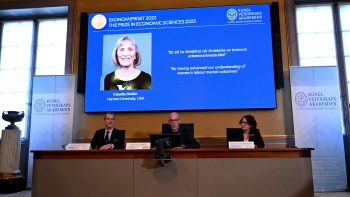Adapting microfinance to the 21st century
Microcredit is celebrated as a way for families and entrepreneurs in developing countries, often women, to climb out of poverty and provide class mobility. Pioneered by economist Muhammad Yunus during the 1970s in Bangladesh, advocates are facing the challenge of adapting the technique to a digital world.
Yunus won the Nobel Peace Prize in 2006 for his work on microfinance, but he’d be the first to tell you that the microcredit industry could use an update.
His first micro-loan was $26 to a group of Bangladeshi women, when the country was dealing with famine. Those loans turned a modest, but significant, $0.02 profit.
On the impact of his 2006 Nobel Prize on microfinance:
“It has drawn a lot of attention. Today, we are building up the second generation of those families who are in microcredit, so that their children do not [remain] illiterate. We made sure 100 percent of [their] children go to school … this is transforming the whole family completely.”
On other microcredit projects like Kickstarter:
“It’s a good idea…outside initiative is good, but it can be misused. When we talk about social business, somebody can use this, take this word and go in the wrong direction. But … social business is a business to solve problems of the people. It’s not about making money. If somebody is selling wristwatches, that is not a social business, because you’re not solving any problem.”
On the future of microfinance:
“First of all, it has to be a poor orientated, problem-solving orientated financial institution. Second, it needs a legal framework. Today, it doesn’t have a legal home. Conventional banks have a legal home … there is not a banking law to create [a] bank for the poor. So we have go around, find money to lend money to people. If we had a banking license, we don’t have to worry about anybody. We just take deposits and lend money to people as many people as we can get. So that’s what the missing piece is that we have to make sure that we fill it up.”
CORRECTION: In a previous version of this story, the amount of Yunus’ first micro-loan was incorrect in the text. The loan was $26. This has been corrected.
There’s a lot happening in the world. Through it all, Marketplace is here for you.
You rely on Marketplace to break down the world’s events and tell you how it affects you in a fact-based, approachable way. We rely on your financial support to keep making that possible.
Your donation today powers the independent journalism that you rely on. For just $5/month, you can help sustain Marketplace so we can keep reporting on the things that matter to you.


















